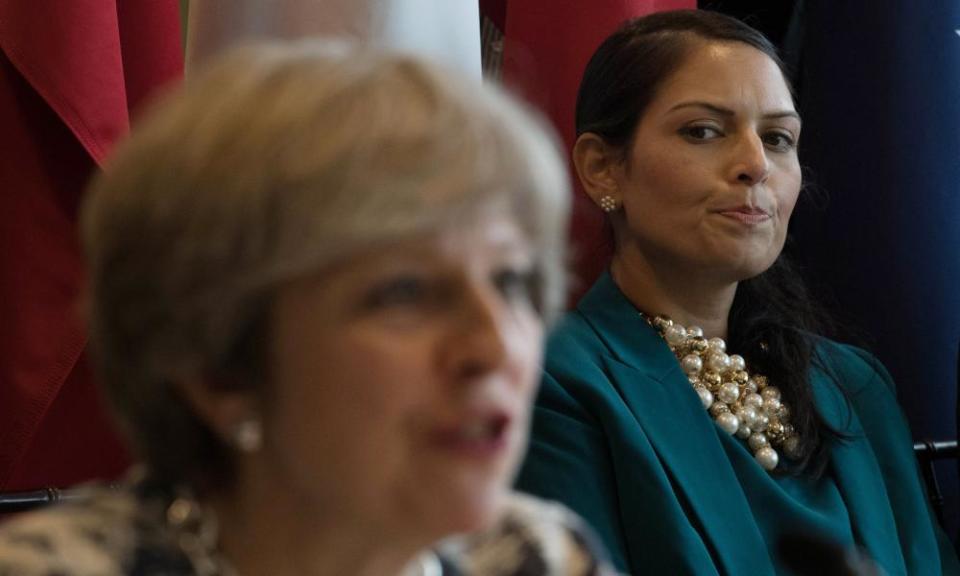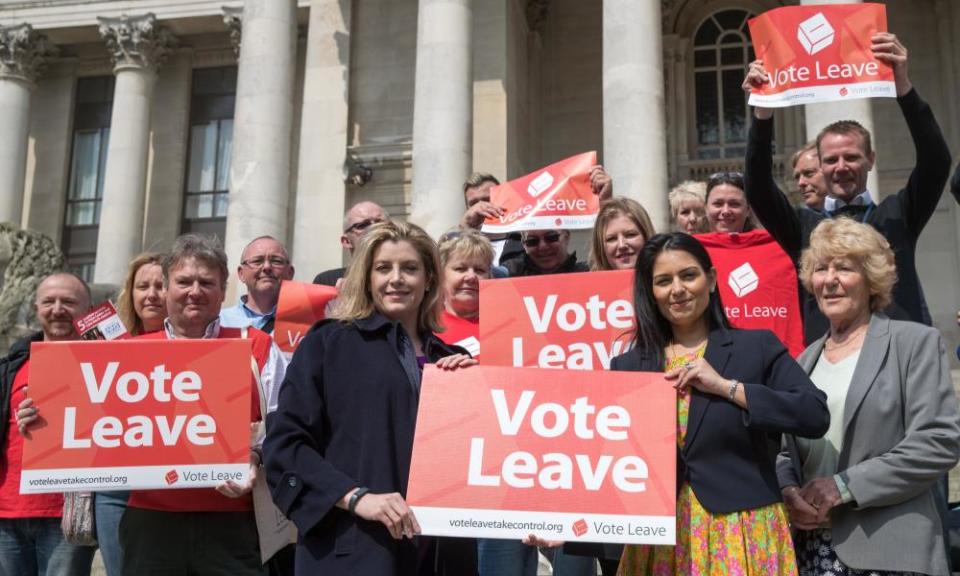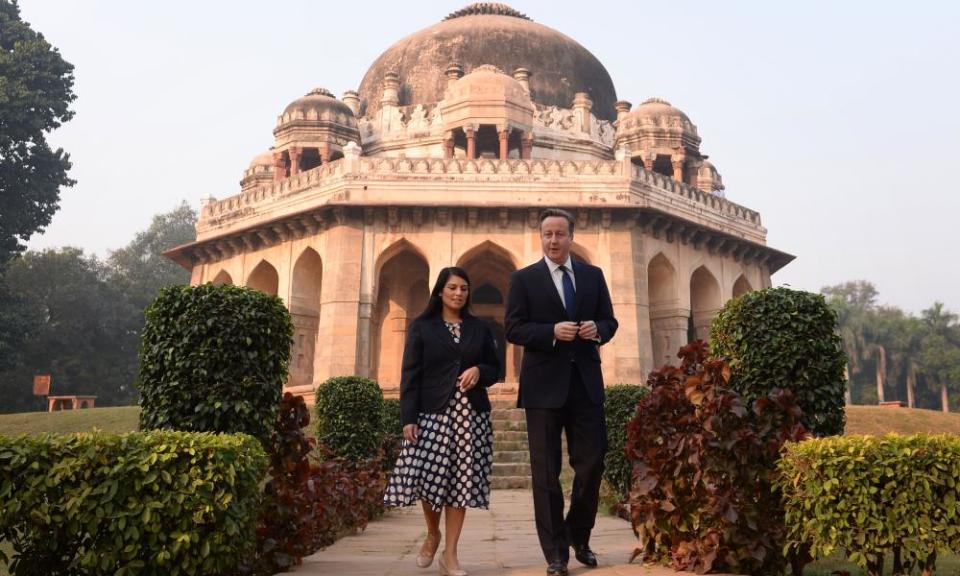Priti Patel's balancing act as home secretary
Priti Patel did not betray so much as a flicker of anger. Her voice was calm, her shoulders steady, and she bit her lip only very briefly before responding to black MP Florence Eshalomi’s emotional call for her to acknowledge and act on the fears raised by Black Lives Matter protesters taking to the streets.
She was “saddened”, she told the House of Commons, to be accused of failing to understand: “It must have been a very different home secretary who as a child was frequently called a Paki in the playground; a very different home secretary who was racially abused in the streets, or even advised to drop her surname and use her husband’s in order to advance her career.” She needed no lessons on racism from Labour, she said.
It was an arresting exchange, more so since Patel rarely talks of such things. She prefers to cast herself as the immigrant shopkeeper’s daughter made good, in a consciously upbeat echo of her heroine Margaret Thatcher; a woman defined by overcoming adversity, not suffering from it. It’s a gung-ho attitude that has helped the Tories’ first female Asian MP rise to the top of a post-Brexit party. Yet it means surprisingly little is known about what makes the most senior woman in Boris Johnson’s cabinet tick. Even some of Patel’s colleagues are said to have been surprised by her vehemence towards Eshalomi, a thoughtful new MP of only a few months’ standing, and 32 Labour MPs warning that “being a person of colour does not automatically make you an authority on all forms of racism”. Some felt that as a woman of Asian heritage, Patel couldn’t claim expertise on black British experiences.
Yet if there was a weight of history behind Eshalomi’s questions – she was thinking, she says, about her three-year-old son growing up and being targeted for stop and search – there was history too behind Patel’s response.
(May 2, 2010)
Becomes the first female Asian Conservative MP. Picked for junior ministerial roles in the Treasury and Department for Work and Pensions by David Cameron. Allies herself with the ‘new right’ when she co-authors – with Dominic Raab, Kwasi Kwarteng, Chris Skidmore and Liz Truss – a 2012 book called Britannia Unchained, which calls for lower taxes and massive economic deregulation, with one section famously describing Britons as ‘among the worst idlers in the world’.
(May 2, 2015)
Gains the right to attend cabinet after the election as secretary of state for the Department of Work and Pensions. A lifelong Eurosceptic, she campaigns vigorously for Vote Leave in the 2016 Brexit referendum campaign. Attracts ire from Emmeline Pankhurst’s great granddaughter, Helen, when she compares her anti-EU women’s campaign group, Women for Britain, to the suffragettes.
(July 2, 2016)
Becomes international development secretary under Theresa May, raising concerns among departmental staff and aid charities because of her support for Brexit and her longheld scepticism towards international development and aid spending. One charity even compiles a cuttings dossier of her previous statements calling for the aid budget to be reduced or redistributed.
(November 2, 2017)
The BBC’s James Landale breaks the story that Patel has held unauthorised work meetings in Israel with senior figures including Benjamin Netanyahu, the prime minister, during what was billed as a family holiday. She is summoned to Downing Street and, after first robustly defending herself, she resigns.
(July 2, 2019)
After less than two years on the backbenches, returns to the cabinet under Boris Johnson in July as home secretary, prompting rights groups to raise her previous comments on areas including immigration, asylum and criminal justice – not least the death penalty, of which she spoke in favour on the BBC’s Question Time in 2011, a view she now disowns.
(February 2, 2020)
Sir Philip Rutnam, the Home Office’s top civil servant, resigns and threatens to sue for constructive dismissal after what he calls ‘a vicious and orchestrated’ campaign against him by Patel. A string of further allegations emerge of her bullying, intimidating, belittling and shouting at civil servants in DfID and the DWP as well as the Home Office. She is said to have been cleared by a Cabinet Office inquiry, as yet unpublished.
(June 2, 2020)
Criticises police chiefs for not clamping down on the Black Lives Matter protesters who toppled the statue of Edward Colston in Bristol. Condemns the actions of protesters around the country as ‘reckless and unlawful’. Stokes controversy when she tells the Commons she will not ‘take lectures’ on racism, having experienced it herself.
All her life, she has faced uncomfortable questions about reconciling her politics with her identity. How can she justify curbs on so-called low-skilled immigration, which might have stopped her own parents coming to Britain? How could she be cheerleader for the leave campaign, which some saw as xenophobic, or defend the hostile environment for immigrants that led to the Windrush scandal (while apologising to Windrush victims themselves)? She has been accused of selling out, letting herself be used as cover for racist policies; on social media she has been called a “coconut”, a racist term for someone deemed brown on the outside but white inside.
Yet there is genuine anger among ethnic minority Tories both at charges of betrayal from the left, which they see as inflammatory in the current climate, and at what they see as pressure to conform to leftwing ideas of how they “should” think. For all the liberal fury Patel attracts, meanwhile, she can never go far enough for some on the right. She walks a similar tightrope to that described by Sam Gyimah, the black former Tory minister who defected to the Liberal Democrats, when he wrote recently that “many on the left were frustrated with me for not being black enough, and on the right for not quite belonging”.
Priti Patel was born in London in 1972, to parents who had fled Uganda just before Idi Amin’s decision to deport all Asians. The Patels were originally of Gujarati Indian origin and she has said that her grandfather owned cotton and tea plantations overseas, yet they arrived in Britain with nothing. Her father dropped out of his studies to take low-paid work, eventually establishing his own chain of corner shops. His daughter grew up playing under the tills while her parents worked, then helping in the shop herself (it was a customer, the Conservative MP Cecil Parkinson, who first encouraged her to join the party.) She often talks of her gratitude to Thatcher for creating the conditions for her family to succeed, and like her, stands in an old rightwing tradition whose message is that if one person can succeed against the odds then others can be inspired to do so. It’s an ideology that doesn’t particularly emphasise solidarity with one’s own race, sex or class and often shifts responsibility on to people to solve their own problems rather than on society to change, reassuringly perhaps for those whose interests lie in society remaining roughly as it is. (Famously, Thatcher managed to become Britain’s first female prime minister while insisting that she didn’t believe in women’s lib, winning over men who might otherwise have felt threatened by her.)

After Watford Grammar, an all-girls comprehensive, Patel studied economics at Keele University, followed by politics at the University of Essex. She was still at university when John Major’s disastrous exit from the European exchange rate mechanism triggered the Black Wednesday crash, and a recession in which her parents’ businesses were badly hit.
That helped seal what was to become a lifelong distrust of anything to do with the EU. Patel’s first serious job was as chief press officer for James Goldsmith’s Eurosceptic Referendum party, a forerunner to Ukip. But when it disbanded after the 1997 election she came to work for the new Tory leader, William Hague, an instinctive Eurosceptic.
It was there, as a cub lobby reporter, that I first came across her; then in her mid-20s, she was friendly and energetic, with a sharp nose for news. As a rough indication of what Westminster culture in the 1990s was like for young women, I have an excruciating memory of being made to call her about a picture story my then boss insisted on running, the working title for which was “Priti by name, pretty by nature” (she was always immaculately turned out). She was very easygoing about it, given she wasn’t hired for her looks, but then she perhaps comes from that breed of Tory woman who associates complaining with playing the victim.
She left Hague’s team in 2000 to work for the PR firm Weber Shandwick, followed by a stint at the drinks giant Diageo. It was during this period that she met and married Alex Sawyer, a marketing consultant and Tory councillor in Bexley, south London, while also hunting for a parliamentary seat. She was championed by some powerful names, including the then leader Iain Duncan Smith, but a winnable seat proved elusive (she ended up fighting the impossibly safe Labour seat of Nottingham North in 2005.)
The big dividing line of the era was not yet Europe, but how far the Conservative party needed to change in order to win. In the battle between modernisers – anxious to detoxify the brand by getting more female and ethnic minority MPs elected – and more reactionary traditionalists, Patel was classed as a moderniser. She told the Daily Telegraph in 2002 that her party’s problem was so obvious “it’s in spangly colours and flashing lights; this party has got to progress… We are seen as the nasty party. At the last election we were against things but not for anything.”

Yet she was quick to say she had been taken out of context when she was quoted a year later by the Financial Times talking about “racist attitudes” in the party, words that could easily have damaged her chances with grassroots Tories already suspicious of the modernisers’ agenda. Already she was learning to walk a very fine line.
Whether or not she chose to discuss it publicly, her allies certainly felt she was encountering prejudice both because of her ethnicity and her gender (selection panels were famously suspicious at the time of young women they thought might go on to have children). She was advised by at least one sympathetic senior MP to tone down the moderniser stuff, and stress her Euroscepticism instead. Shortly afterwards she landed the winnable seat of Witham in the Essex commuter belt, following a barnstorming performance before the selection panel in which she declared law and order was breaking down and backed capital punishment. (She endorsed it again on BBC Question Time nine years ago, but now insists she was never an “active supporter”; her hardline views on crime have, however, been consistent throughout her career. She is an instinctively authoritarian home secretary, whose reaction to graffiti being daubed on the Cenotaph last month was to suggest 10-year sentences for defacing war memorials).
Although she didn’t emphasise it, winning Witham in 2010 was a genuine watershed moment. “Remember, until she gets elected that night, there has never been a British Asian woman elected; then there’s six that come in together,” says Sunder Katwala of British Future, the identity and immigration thinktank. “That just seems a million years ago now, but it wasn’t.” Although there have been male Asian MPs since 1892 and Diane Abbott became the first black female MP in 1987, one last hurdle to representation remained. Of the six who finally cleared it, Patel was the only Tory.
Her first few months at Westminster weren’t easy. Her son Freddie was not yet two, and politically she wasn’t close to the clique around David Cameron. When she defied the whip in 2011 to vote for an EU referendum (not yet party policy), she knowingly blew any chance of early promotion.
Yet hers was an unusually independent-minded intake, who decided early that slavish loyalty to the Cameron-Clegg coalition wasn’t necessarily in their long-term interests. Patel quickly allied with the so-called “new right”, mostly from more humble backgrounds than Downing Street’s Old Etonians and more hardline on issues such as welfare and the free market; together with Liz Truss, Kwasi Kwarteng, Chris Skidmore and Dominic Raab (all but Skidmore now in Boris Johnson’s government) she co-authored their mission statement, a book called Britannia Unchained. A trenchant defence of capitalism in a post-crash era, it complained that “too many people in Britain prefer a lie-in to hard work”.
Yet what’s striking, rereading it in the wake of the Black Lives Matter movement, is that it opens with a notorious story from the previous year’s London riots. A young Malaysian-born student, newly arrived in Britain, had inadvertently cycled into the wrong place at the wrong time; first he had his jaw broken by a teenager who stole his bike, and then he was robbed by two others who pretended to help him. For Patel and her fellow authors, Ashraf Rossli symbolised the best of immigrant Britain, with his A grades and determination to succeed; his 17-year-old attacker, Beau Isagba, represented the worst of what his country had become. The story was intended to signal that “good” immigrants who worked hard to succeed were more than welcome, with the book lauding Asian tiger economies’ work ethic and high educational aspirations. But seen through a 2020 lens, what’s striking is the contrasting of an aspirational Asian teenager with a violent young man who – although the book doesn’t say so – was black. (One uncomfortable undercurrent of Patel’s clash with Florence Eshalomi is the way it suggested growing differences between BAME communities. A key demographic for the Conservative party is people of Asian and south Indian heritage, with socially conservative views on issues such as law and order and taxes; but they do poorly among black Britons, a gap arguably now being exposed by the Black Lives Matter movement. Eshalomi herself is clear that “what I experience as a black woman of Nigerian heritage is totally different to what she does” as the daughter of Ugandan Asians, and that one experience shouldn’t be used to silence the other.)

By 2013 Patel had been sufficiently forgiven by Cameron to join his policy unit, and by 2014 was a Treasury minister; after the 2015 election she was promoted to employment minister in the Department for Work and Pensions, attending cabinet. Yet when her prime minister finally called the Brexit referendum in 2016, she risked it all to support what was widely expected to be the losing side, campaigning volubly to leave.
“She’s very popular among Brexiters because like everybody in the cabinet at the time who put their jobs on the line, that was a very brave thing to do,” says Suzanne Evans, the former Ukip deputy chair who was on the board of Vote Leave. “It’s a testament to her principles.” While some wonder how deep Boris Johnson’s Euroscepticism goes, nobody doubts Patel’s. When she unexpectedly backed Theresa May, rather than the more obviously pro-leave Andrea Leadsom, in the post-referendum Tory leadership contest, some saw it not as a mellowing of her views but as an act of revenge for Vote Leave giving Leadsom more airtime than her.
May rewarded her with a poisoned chalice: her first cabinet job, but at the Department for International Development (DfID), something she’d publicly advocated abolishing. Undeterred, Patel hired the Vote Leave staffer Rob Oxley (later to become Johnson’s press secretary) as her special adviser and embarked on a very public search for waste to cut.
By the summer of 2017, May’s authority was visibly draining away but Patel’s star was rising. Her crowd-pleasing speech to that year’s party conference strayed well beyond the aid brief into a ringing statement of her credo that “wealth is created by people and enterprise. I believe in people, markets and freedom.”
A month later, the BBC broke the news that during a family holiday to Israel that summer Patel had met senior Israeli politicians without telling the foreign secretary, a startlingly cavalier breach of the rules. More intriguingly still, she was accompanied by the Tory peer Lord Polak, chair of Conservative Friends of Israel; given his impeccable connections among Tory donors, the instant assumption was that she was preparing for a leadership bid. To May’s fury, further details of undeclared contacts with Israel emerged, and Patel was forced to resign. She spent only 18 months on the backbenches before new leader Boris Johnson gave her not just a comeback but a big promotion to home secretary, with a remit to deliver on the promised control of Britain’s borders.
It was seven months later that the first allegations emerged of her bullying, belittling and shouting at civil servants. Claims of a “toxic clash” with her permanent secretary Sir Philip Rutnam ended in Rutnam resigning, and threatening to sue for constructive dismissal. Similar stories began trickling out of the DfID and the DWP, where a formal complaint of bullying and harassment against the department was reportedly settled out of court for £25,000 with no admission of liability.
Patel can be utterly charming, and disarmingly kind. When the bullying allegations emerged, 100 professional acquaintances signed an open letter to the Daily Telegraph in her defence. But with even her own husband reportedly calling her his “personal piranha”, colleagues don’t deny she has a temper, especially behind closed doors. As one puts it: “If you work with Priti Patel you see one Priti Patel, and if you work for her you see a different one.” Her pace is legendary – she rises at dawn, leaves late, and works through weekends – and she has no patience for being told something can’t be done, or having her convictions challenged.

Some however see her bulldozing style partly as a means of hiding her own insecurities in a department notorious for being a political graveyard. “I think she herself is incredibly insecure, and the way that plays out is kicking the nearest dog. She isn’t as smart as some of the previous occupants,” says one former Tory staffer. Although she was thrown a lifeline this spring when leaked reports of an inquiry into her behaviour by the cabinet secretary found no evidence of breaching the ministerial code, at the time of writing the full report has yet to be published.
Nonetheless, some suspect her ambitions don’t end at the Home Office. “I think Priti’s ambition will be undimmed,” says a former Tory minister. “If she navigates [the bullying allegations] successfully she’ll be encouraged by that. She’ll see it as an attack by enemies that she has overcome. The Home Office is a poisoned chalice but if she can make a political success of it among the Conservative electorate and the MPs then why not? She has a following.” It’s a mark of how far the party has changed that some speculate its next leadership contest could be between Patel and the more pragmatic current chancellor, Rishi Sunak. But if the party has never looked more diverse, that’s not necessarily the same thing as more progressive.
In his autobiography, David Cameron writes that of all the ministers who campaigned against him for leave, it was Patel’s behaviour during the referendum that “probably shocked me most”. There was unease in No 10 over her willingness not just to attack the government of which she was still part but to front inflammatory Vote Leave messages suggesting that immigrants were fuelling a shortage of primary school places, or wealthy remainers didn’t understand how immigration hurt the poor.
Tories who have worked in government with her dismiss the idea that she’s a puppet, manipulated into mouthing other people’s slogans: “It’s her, it’s what she believes.” But those beliefs are perhaps more complex than is sometimes acknowledged.
The points-based immigration system she is introducing has been widely criticised for excluding so-called low-skilled migrants, doing jobs that in some cases have proved vital during the pandemic. But to the dismay of some leavers, it contains no legal cap on the numbers coming in; she has ditched Cameron’s target for immigration to be limited to “tens of thousands”. During the referendum she repeatedly argued that ending unlimited free movement from the EU could mean Britain accepting more skilled migrants from former Commonwealth countries such as India or Pakistan, and she pushed hard inside cabinet for nearly 3 million Hong Kong citizens to be offered visas to live and work in Britain, amid escalating tensions with China. (Some wonder whether she sees parallels between the Hong Kong cases and her own parents fleeing Uganda; when asked why she devises policies that might have excluded her own family, she invariably insists they weren’t coming to Britain seeking work – as entrants under the points-based system will be – but escaping a hostile regime, suggesting they might be classed as political refugees). For now, her tough stances on immigration and crime make her critical to No 10’s plans. But is her position as secure as it looks?
She is the most senior woman in cabinet, yet wasn’t officially added to the innermost “quad” taking all the big coronavirus decisions until June, and appeared only rarely at the daily coronavirus press conferences. The rightwing tabloids love her, but some old Whitehall hands wonder if those eye-catching headlines are coming at the expense of long-term strategy. “Her survival is dependent on her playing her part as a key cavalier in the culture war, and that’s the problem,” says a former Tory aide.
And while the Conservative faithful still adore her, the unspoken rule seems to be that she doesn’t make them feel uncomfortable. “Priti Patel is loved by the grassroots, but that’s because she expresses the views of the grassroots,” says one former colleague, who argues her appeal lies in making the party feel good about itself for choosing her. But like all tightrope walkers, Patel must know that if she makes the wrong call, the ground can be a very long way down.

 Yahoo News
Yahoo News 
